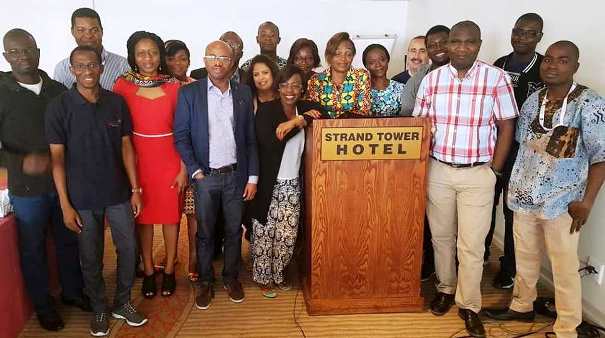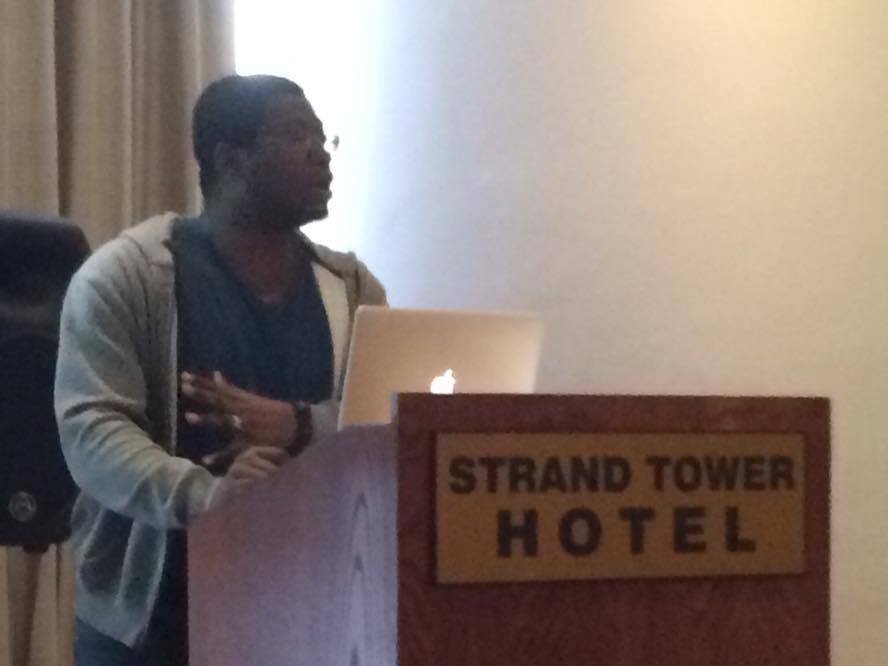FraNet : Analysing the Demographic DividendCape Town, South Africa, 29 October 2017 Organized by the IUSSP Network on Strengthening Demographic Training in Francophone Africa (FraNet)
The Network's Steering Committee : • Chair: Parfait Eloundou Enyegue (Cornell University) • Members: Gervais Beninguisse (Institut de Formation et de Recherche Démographiques), Philippe Bocquier (Université Catholique de Louvain), Valérie Delaunay (Institut de Recherche pour le Développement), Jean François Kobiané (Université Ouaga I Pr Joseph Ki-Zerbo), Richard Marcoux (Université de Laval).
The IUSSP Network for Strengthening Demographic Training in Francophone Africa (FraNet) organized a meeting before the International Population Conference to review the networks ongoing project analyzing the potential for a demographic dividend in a number of African countries. The meeting was organized with the collaboration of CARE-IFA (la cellule d’Appui à la Recherche et à l’Enseignement des Institutions Francophone d’Afrique) and with funding from the William and Flora Hewlett Foundation.
Members of FraNet at the side meeting in Cape Town.
The meeting’s objective was to officially announce three publications produced by FraNet to contribute to the study of the demographic dividend in Africa. These publications have been produced with policy makers and the public in mind as well as researchers.
For the general public, the network finished the production of “50 questions about the Dividend”, which aims to respond to questions posed by the public about the demographic dividend: what is a “demographic dividend”, how large is it, and what are the conditions needed to reap a demographic dividend in Africa. This publication was produced during a series of meetings that took place at ISSP (Ouagadougou, Burkina Faso) and at IFORD (Yaoundé, Cameroon ) with the assistance of a network of local journalists working on health and development. The document is an update of an earlier version that covered 11 questions on the demographic dividend.
For policy makers, the network completed a study evaluating the estimations for the demographic dividend in each African country. The evaluation looked at the potential economic impacts of the demographic dividend, specifically the gross per-capita GNP and provides indicators for future tendencies. The document presents for each country the date of entry into the window of opportunity, the period of advancement in the process of producing a dividend, and an estimation of the size of the dividend using decomposition methods developed by FraNet members.
For researchers, the network produced a new and updated addition of its reference manual on decomposition methods that includes applications to the study of the demographic dividend. One of the innovations is the extension of the method to several areas – not only the economy, but also education, health, inequality and security. In addition to methodological extensions included in the volume, FraNet also presented a video (in English) that further develops the security implications of the demographic dividend.
The meetings activities took place in two phases. During the morning session, after a word of welcome, Professeur Gervais Beniguisse presented an l’overview of FraNet’s activities since its creation in 2009. FraNets’ activities covered the training of researchers in innovative tools and methods for the development of demographic research in Africa, the training of parliamentarians, journalists and opinion leaders in the use of statistical graphs, and the appropriation of the concept of the demographic dividend. Mohammed Bedrouni followed with a presentation of « 11 questions sur le dividende », the first publication by FraNet on the demographic dividend. He highlighted the widespread appreciation of this document by the public which led to its translation and dissemination in English and Arabic.
Mohammed Bedrouni presenting "11 questions on the dividend".
Parfait Eloundou-Enyegue, then presented “50 questions about the dividend”. This document summarizes the concerns of the public on a large range of questions about the dividend that had been given to members of FraNet. The questions, developed in a participative manner, were evaluated and modified by journalists, policy makers, opinion leaders and every day citizens. The document is organized into 5 sections each containing 10 questions on the following themes: definition, theory, methods, empirical results, and policies. The most contentious questions were revisited by participants during the meeting. A network of Camerounais journalists working in health and development, will give the document one last review before it is completed..
Two videos were also presented. The first was an animated video about the security implications of the demographic dividend in Sub-Saharan Africa produced by Sarah Giroux and Parfait Eloundou-Enyegue. The second video is a documentary report produced by Marie Virginie Mbusnum, a journalist, on the national dividends. Adrienne Engono, also a journalist, ended the morning session, highlighting the collaboration between the media and researchers from the FraNet Network.
Adrienne Engono during her presentation on collaboration between the Network and the media.
The afternoon session, focused on the upcoming publications on the economic fallout of the demographic dividend, the manual on decomposition methods and a volume on the educational dividend. The first work, presented by Michel Tenikue, examines the first signs of a demographic dividend in Africa and its estimation using decomposition methods. This work is currently being edited for publication. The second work, presented by Firmin Zinvi and Parfait Eloundou-Enyegue, focuses on the manual on decomposition methods “Understanding social change: the contribution of decomposition methods and their application to the demographic dividend.” This book, an update of the 2010 edition with new material, contains 8 chapters organized around 5 points: type of problems, graphic and numerical illustrations, mathematical formulation, practical applications, and the methods application to the study of the demographic dividend. The third work, presented by Charles Moute and Firmin Zinvi, highlighted the implications of the dividend for education looking at 40 African countries for which data is available. This work is currently in review before the final editing and publication stage.
Charles Moute during his presentation on the educational dividend.
At the end of the meeting, three recommendations were made with the aim of improving the visibility of FraNet’s activities:
See also: Funding: The IUSSP Network for Strengthening the Demographic Training in Francophone Africa is supported by The William and Flora Hewlett Foundation.
|
|




